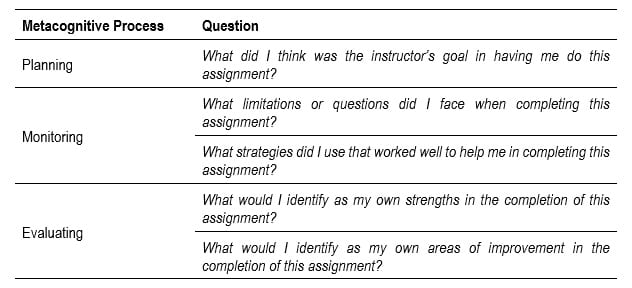Leslie LEE
Department of English, Linguistics and Theatre Studies, Faculty of Arts and Social Sciences (FASS)
Leslie shares his experience of adapting Tanner (2012)’s approach to promoting metacognition amongst undergraduates, i.e. administrating self-questions to raise students’ metacognition in his undergraduate linguistic morphology course.

Image by ijeab on Freepik
Lee, L. (2024, March 26). Integrating reflections on assignments to develop metacognitive awareness. Teaching Connections. https://blog.nus.edu.sg/teachingconnections/2024/03/26/integrating-reflections-on-assignments-to-develop-metacognitive-awareness/
Metacognition refers to the knowledge that we have about our own cognitive processes (Flavell, 1979). It is recognised as an important aspect of learning (National Research Council, 2000, 97).
Tanner (2012) discusses ways to promote metacognition amongst undergraduate students of biology, including administrating self-questions for learners to ask “in the process of planning, monitoring, and evaluating their learning”. Adapting Tanner’s self-questions to linguistics, Vallejos and Rodríguez-González (2021) explored the impact of employing self-questions to raise undergraduates’ metacognition as they did their assignments, and found that these helped students to:
- Notice learning concerns and self-capabilities;
- Raise awareness about learning strategies and develop self-efficacy;
- Better communicate needs and challenges when completing a task;
- Highlight the importance of time management and teamwork;
- Recognise that asking for help is key to monitor their understanding and learning;
- Reflect upon research skills and persona growth
Inspired, I adapted a subset of the questions (see Table 1, organised according to the metacognitive processes of planning, monitoring, and evaluating) to three iterations of an undergraduate linguistic morphology course I offered between 2021 and 2023. These were implemented as reflection questions1 that accompanied an assignment, and accounted for a nominal percentage of the continuous assessment marks, graded on a “Complete/Incomplete” basis. There were no word-count restrictions and I emphasised to the students that there were no “correct” or “wrong” responses.
Table 1
Reflection questions

Unlike Vallejos and Rodríguez-González (2021), who administered their survey only once in their courses, I was curious if the repeated administration of the survey over a semester would have any additional benefit to the students. Hence, I administered my survey four times over the semester: once accompanying each of the three homework assignments, and once with the final term project. In the 2022 and 2023 iterations, the final survey included two additional questions:
- Do you agree with this statement? “The reflection questions have benefited me in my learning and self-growth.”
- What (positive or negative) impact has responding to these reflection questions over the semester had on your learning and self-growth?
Due to space constraints, I will not discuss the students’ responses to the questions in Table 1 here, and focus instead on responses to these latter two questions.
A small minority (<9%) who read the course in 2022 and 2023 felt that they did not benefit from the reflections. The reasons provided suggested that these students either already possessed a high degree of self-awareness or were not invested in reflecting:
- “I expected myself to face these challenges and I know my strengths especially since this is my last semester of uni.”
- “(…) maybe because I don’t really put too much effort into it (…) But I think it helped me reflect on the journey that I had in this module, which might have helped in my learning and self-growth, but I’m not introspective enough to know.”
Other negative impacts of responding to reflection questions were along the lines of:
- “(…) sometimes it’s really hard to come up with an answer, maybe I am just not self-aware at all… But maybe that is what this is for??”
- “I think a negative impact may just be worrying whether I answered the reflection question uniquely enough from the last time I did it or wrote long enough.”
Nonetheless, an overwhelming majority (91%) agreed that they benefited. Positive impacts identified by the students included the following:
- “The reflection questions did help me to think back on how I approached each assignment and allowed me to use what worked and discard what didn’t in previous assignments.”
- “Thinking about the instructor’s goal helped me reflect on the purpose of the assignments and to illuminate how they were reinforcing my learning no matter the stress and suffering of going through them. I understood how they were helping me to apply what I learnt as knowledge progressed.”
- “it provides a feedback channel for me to convey my learning concerns to [the instructor] and I saw my concern being addressed in one of the assignment feedbacks.”
- “I think that they helped me to more or less process my thought processes (…) figure out what exactly I had struggles with (…) it also helped me to process my disappointments in my work, but allowed me to consider how I can perhaps do better in other modules or what good strategies there could possibly be.”
Students also saw benefits in completing multiple reflections over the semester:
- “I was able to reflect on my own growth throughout the module as well as work on improving my own personal workflow and productivity habits.”
- “The fact that the questions are the same caused me to compare myself in relation to the periods I did each survey (…) this allowed me to improve myself…”
- “I became more aware of how I learn. I made changes and adopted new strategies in order to improve. I will try to keep those in mind and reflect on my future work as well.”
Overall, while a small minority did not see any benefits to the reflections, an overwhelming majority of students did and appreciated the exercises. There is evidence that implementing regular reflections on assignments over the semester can help develop students’ metacognitive awareness, and that this effect is not simply limited to the assignment or course at hand, but has the potential to be more long-term and benefit students’ learning elsewhere, more globally. This is consistent with previous studies that have studied the effect of reflection on understanding and transfer of learning (see e.g. Lin & Lehman, 1999 and references therein).
Endnote
- One can conceive of many different types of “reflections”. The questions used here did not require students to reflect on the content of what they were learning, but on their learning process.
References
Flavell, J. H. (1979). Metacognition and cognitive monitoring. A new area of cognitive-developmental inquiry. American Psychologist, 34(10), 906-11. https://psycnet.apa.org/doi/10.1037/0003-066X.34.10.906
Lin X., & Lehman, J. D. (1999). Supporting learning of variable control in a computer-based biology environment: Effects of prompting college students to reflect on their own thinking. Journal of Research in Science Teaching, 36(7), 837-58. https://doi.org/10.1002/(SICI)1098-2736(199909)36:7%3C837::AID-TEA6%3E3.0.CO;2-U
National Research Council. (2000). How People Learn: Brain, Mind, Experience, and School: Expanded Edition. The National Academies Press. https://doi.org/10.17226/9853.
Tanner, K. D. (2012). Promoting student metacognition. CBE–Life Sciences Education, 11(2), 113-20. https://doi.org/10.1187/cbe.12-03-0033.
Vallejos, R., & Rodríguez-González, E. (2021). The impact of metacognition in linguistics courses. [Poster Presentation, organized session on Scholarly Teaching in Linguistics in the Age of Covid-19 and Beyond]. 2021 Annual Meeting of the Linguistics Society of America. https://lingscholarlyteaching.org/2021/01/05/poster-b7/.
 |
Leslie LEE is a Senior Lecturer in the Department of English, Linguistics and Theatre Studies (previously known as the Department of English Language and Literature). He teaches several foundational courses in linguistics, as well as more advanced seminars on morphology and syntax. His research interests cover pattern/construction-theoretic and usage-based approaches to linguistics, interfaces between (*word-based*) morphology, (*non-derivational*) syntax, and (lexical) semantics, dialectal variation, and quantitative approaches to the study of language. Leslie can be reached at leslie@nus.edu.sg. |

